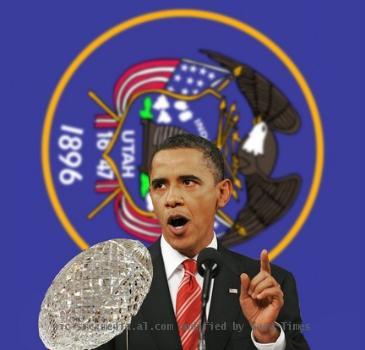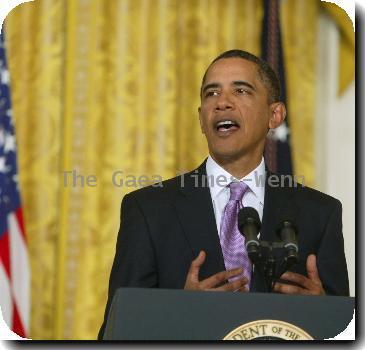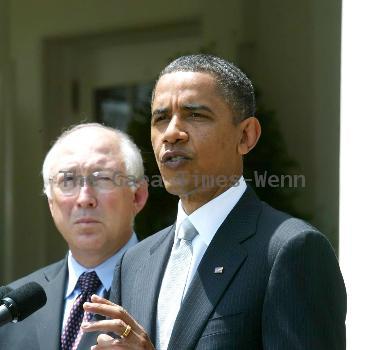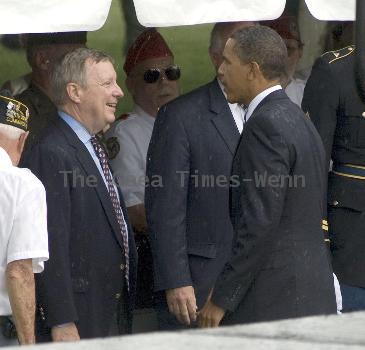BP controversies stealing thunder from David Cameron’s trip to Washington
By Desmond Butler, APTuesday, July 20, 2010
BP stealing thunder from Cameron’s US visit
WASHINGTON — British Prime Minister David Cameron sought to defuse U.S. outrage at British oil giant BP as he met with U.S. President Barack Obama at the White House Tuesday. But the issue kept coming up.
Cameron’s first trip to Washington as prime minister began Tuesday and is being overshadowed by anger in the United States over BP’s spill in the Gulf of Mexico, and questions over whether the British oil giant helped influence the decision to free Lockerbie bomber Abdel Baset al-Megrahi from jail last year and send him home to Libya.
Cameron arrived at the White House in the late morning for his one-on-one meeting with President Barack Obama. The prime minister was then to have a working lunch with Obama and Vice President Joe Biden, whom he met earlier for breakfast at the British Embassy.
Obama and Cameron were to take questions from reporters later in the day.
Cameron had hoped to use his first official visit to the White House to build his standing as a statesman and develop his relationship with Obama. Instead, he is being forced to focus on the British government’s decision last August to return the cancer-stricken prisoner to Libya on compassionate grounds.
“As leader of opposition, I couldn’t have been more clear that I thought the decision to release al-Megrahi was completely and utterly wrong,” Cameron told the BBC.
In Tuesday’s meeting, Cameron and Obama will discuss a host of pressing issues. Chief among them will be Afghanistan. Britain has been the most crucial U.S. military partner in Afghanistan but is facing inevitable budget cuts and the unpopularity of the war. Cameron has said he wants the country’s 10,000 troops out by the time of Britain’s next election, which must be held by 2015.
The leaders also are likely to discuss stalled Middle East peace prospects and the global economy. But while both sides are playing down the BP issue, they are acknowledging it is likely to come up. Cameron also is expected to come under questioning on that topic in meetings with congressional leaders.
Cameron will meet Tuesday evening with U.S. lawmakers who have urged an inquiry into BP’s lobbying of the British government over al-Megrahi’s release. Cameron’s Downing Street office said a British government-commissioned inquiry was “not currently under consideration.”
The decision to free al-Megrahi was made by Scotland’s government, which holds limited powers within the United Kingdom, and not by the previous British government headed by Prime Minister Gordon Brown.
Al-Megrahi served eight years of a life sentence for the Dec. 21, 1988, bombing of Pan Am Flight 103 over Lockerbie, Scotland, which killed all 259 people aboard, mostly Americans, and 11 people on the ground.
“I have no idea what BP did, I am not responsible for BP,” Cameron said. But he insisted that discussions between BP and Brown’s administration on a prisoner transfer agreement did not include talks involving the al-Megrahi question.
BP has acknowledged that it had urged the British government to sign a prisoner transfer agreement with Libya, but stressed it did not specifically discuss al-Megrahi’s case during those talks. The release followed a $900 million exploration agreement that BP signed with the Libya Investment Corp. in May 2007.
In the same month, Britain and Libya signed a memorandum of understanding that they would negotiate agreements on extradition, mutual legal assistance, civil and commercial law as well as prisoner transfer.
Libya’s proven oil reserves are the ninth-largest in the world, but vast areas remain unexplored. The country has been working to bring in foreign oil companies and investors after U.S. and U.N. sanctions were lifted several years ago.
The U.S. lawmakers asked the State Department last week to investigate whether BP pressured officials as part of efforts to seek access to Libyan oil fields.
Rep. Peter Hoekstra, the top Republican on the House Intelligence Committee, told CBS television’s “The Early Show” Tuesday that the decision to set al-Megrahi free must be investigated “in view of allegations there was an oil-for release deal made.”
“I don’t believe that happened,” he added. But Hoekstra also said the British government “has to go forward and prove that it didn’t happen.”
Speaking to the BBC on Tuesday, Scottish Justice Secretary Kenny MacAskill said he stood by his decision to allow al-Megrahi’s release, saying it conformed both to law and to Scottish values.
In a letter sent Saturday to U.S. Secretary of State Hillary Rodham Clinton and Sen. John Kerry, chairman of the Senate Foreign Relations Committee, Britain’s Foreign Secretary William Hague said there was nothing to suggest BP had influenced the Scottish government.
“There is no evidence that corroborates in any way the allegations of BP involvement in the Scottish executive’s decision to release al-Megrahi on compassionate grounds in 2009, nor any suggestion that the Scottish executive decided to release al-Megrahi in order to facilitate oil deals for BP,” Hague wrote.
Tags: Afghanistan, Africa, Asia, Barack Obama, Central Asia, District Of Columbia, Europe, International Agreements, John Kerry, Libya, Middle East, North Africa, North America, Scotland, United Kingdom, United States, Us-britain, Washington, Western Europe









